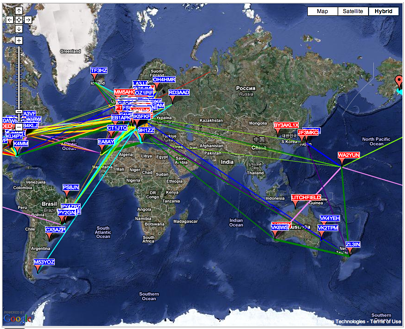Contributors:
- Walter, WN3LIF, writes to express his appreciation for the podcast. He has successfully interfaced his FT-450 to his Linux Mint system.
- Terry, KV6M, alerted Richard to a link spam entry in the forums at blacksparrowmedia.com.
- Bob, VE3SRE, recently found the podcast, and has been a user of GNU/Linux for many years. He's found a good contest logging program, but neglected to mention which one. Let us know, Bob!
- Paul, KC9QYB, of teenradiojourney.com, Kent, VE4KEH, and Bill, KA9WKA, join the roundtable discussion this episode.
Announcements:
- Check out Russ on Hacker Public Radio! In episode 0494, Klaatu interviews Russ at Ohio Linux Fest.
- Another generous donation came from Jim, W9GNG. Thanks very much, Jim! LHS is well on the way to their goal for sending Richard and Russ to the Dayton Hamvention 2010! If you'd like to donate, click on the Donate button at the Linux in the Ham Shack website.
Links and Notes:
- The ARRL has an article about Senate Bill 1755 being passed in the Senate and now moves to the House of Representatives for consideration. A roundtable discussion ensues.
- Kent, VE4KEH, joins the roundtable to discuss WSPR (Weak Signal Propagation Reporter), written by Joe Taylor, K1JT. See also the WSPRnet page for recent observations.
- When you install the .deb package, it may not create a desktop icon. The program installs, by default, into the /WSPR directory. So, you may need to run it by doing the following in a terminal window:
$ cd /WSPR $ ./wspr
- Of course, you'll also need a soundcard interface to your radio. Once running, you should go to the Setup -> Station parameters menu option and enter your callsign, grid square, transmit power, and set your audio device and rig control preferences.
- It can even be used on the experimental 600m band, if you have a license to operate there. On July 28, 2009, the FCC granted the ARRL a modified license for WD2XSH. This modified license allows the experiment to operate with 45 stations across the continental USA, Alaska, and Hawaii. So, unless you're one of the stations specifically authorized to operate on 600m, you should only provide reception reports, and not transmit on that band.
- One final note about WSPR: you must have your computer clock set very accurately. The easiest way is to set up an NTP client on your computer to synchronize your computer clock to one of the network time protocol servers. Here is an article on setting up a Ubuntu client, which should also work for Linux Mint. Or...
- If you RIGHT CLICK on your desktop clock and select "set date / time", there may be an option to automatically set the time. You can select the ntp.ubuntu.com server so you don't overload the public servers.
- When you install the .deb package, it may not create a desktop icon. The program installs, by default, into the /WSPR directory. So, you may need to run it by doing the following in a terminal window:
- Paul recently built a Pixie II QRP CW transceiver kit.
- Bill Meara, M0HBr/CU2JL/N2CQR, of the SolderSmoke podcast is also a fan and practitioner of WSPR.
- Bill, KB3CVA, has a telnet BBS online at https://phantombbs.net.
- Russ discusses a gizmodo article about Microsoft patenting the sudo command. It's not likely that the patent is enforceable. Don't Panic. 🙂 Articles on ars technica and Information Week have a more realistic slant on the issue.
- Tip: to eliminate having to enter your password each time you use the sudo command:
- First, edit the /etc/sudoers file using the visudo utility. It is considered insecure to tweak the /etc/sudoers file manually.
$ sudo visudo /etc/sudoers
- Uncomment this line by removing the # character:
# %sudo ALL=NOPASSWD: ALL
- So it now looks like this:
%sudo ALL=NOPASSWD: ALL
and save the file.
- Finally, add your user name to the sudo group. For example, to add user russ to the sudo group:
sudo usermod -a -G sudo russ
- Log out and in, and enjoy sudo without the password prompts.
- Of course, if you just want to avoid repeatedly typing your password for a session, you can issue the command:
sudo bash -
which will give you a bash terminal session as root, and you can then issue several commands as root without the need for typing sudo at all.
Music:
- "Inside Joke" by Little Thom from the album "Bottomfeeders"
- "A Little Bit of Riddim" by Michael Franti and Spearhead from the album "All Rebel Rockers"
Podcast: Play in new window | Download
